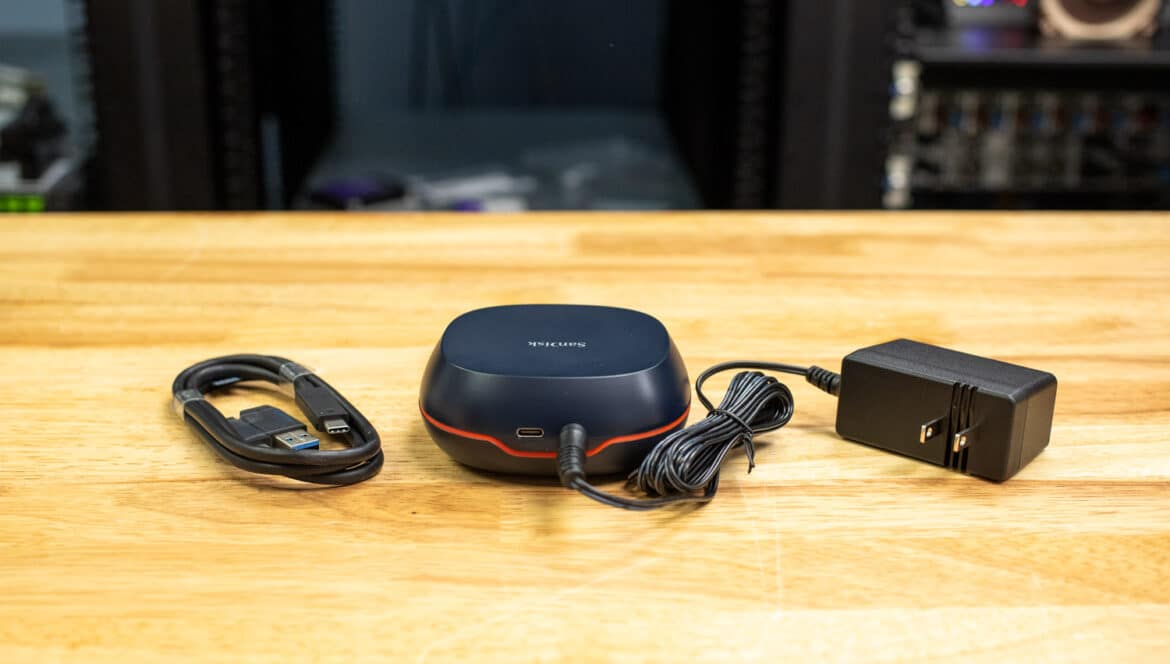The SanDisk Desk Drive is a solid desktop SSD solution that balances high capacity with reliable performance.
The SanDisk Desk Drive is a sleek, compact SSD-based solution designed for users who demand speed and substantial storage capacity. It is built to cater to a wide range of users, from content creators handling large video files and multimedia projects to professionals who need reliable, high-speed storage solutions for everyday use.
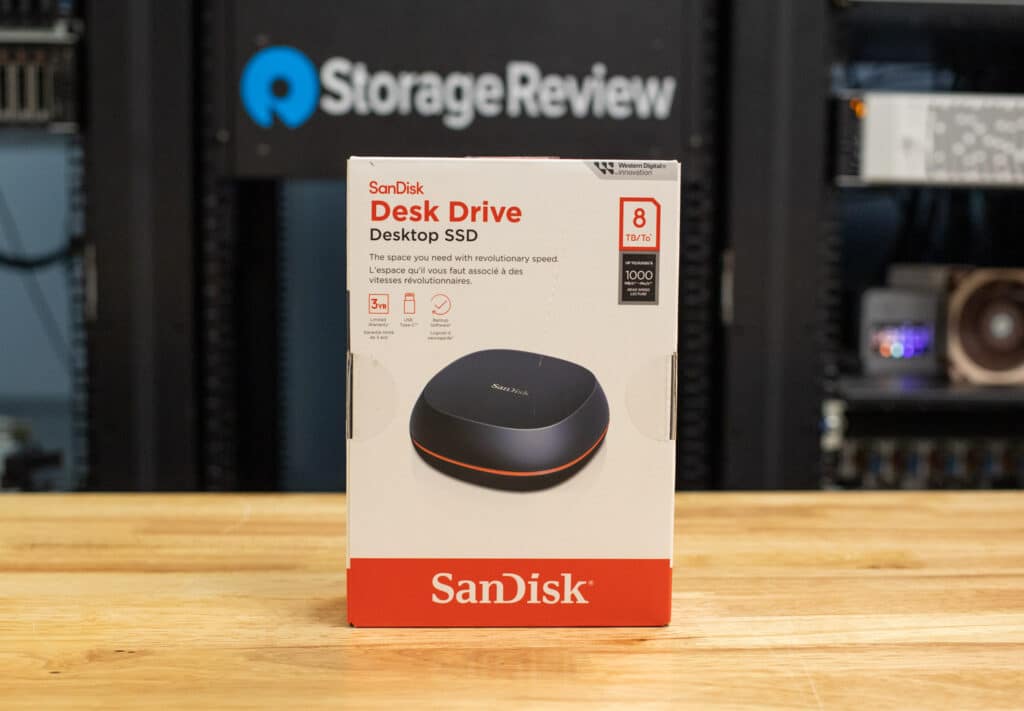
SanDisk Desk Drive Features
The Desk Drive aims to bridge the gap between the high capacity traditionally associated with HDDs and the faster data transfer speeds of SSDs. With capacities of up to 8TB, it is particularly beneficial for users who manage extensive libraries of high-resolution videos, large photo collections, or substantial project files.
The SanDisk Desk Drive stands out from other external storage solutions primarily due to its unique positioning as a high-capacity, desktop-focused SSD rather than a portable or HDD solution. Unlike most portable SSDs, which rely on bus power and are designed for mobility, the Desk Drive uses an external power source. This setup enables it to maintain stable performance levels without draining power from connected devices, such as laptops, making it ideal for stationary use. This design is particularly beneficial for users who need a dependable and fast storage solution that stays in one place, like a backup drive for desktops or a local repository for large files accessed frequently. However, the need for an external power adapter could be a drawback for those seeking a more portable solution.
Performance-wise, while it won’t reach the speeds of the top-end portable NVMe SSDs, professionals like video editors working with 4K footage or a photographer managing an extensive catalog of RAW images will find it a lot faster than hard drives. The Desk Drive’s read speeds are quoted at a solid 1,000MB/s via USB 3.2 Gen 2×1 connectivity.
The drive’s exFAT formatting out of the box ensures immediate compatibility with both Windows and macOS without much hassle, allowing users to get started without the need for reformatting or additional setup—perfect for those who require a plug-and-play solution.
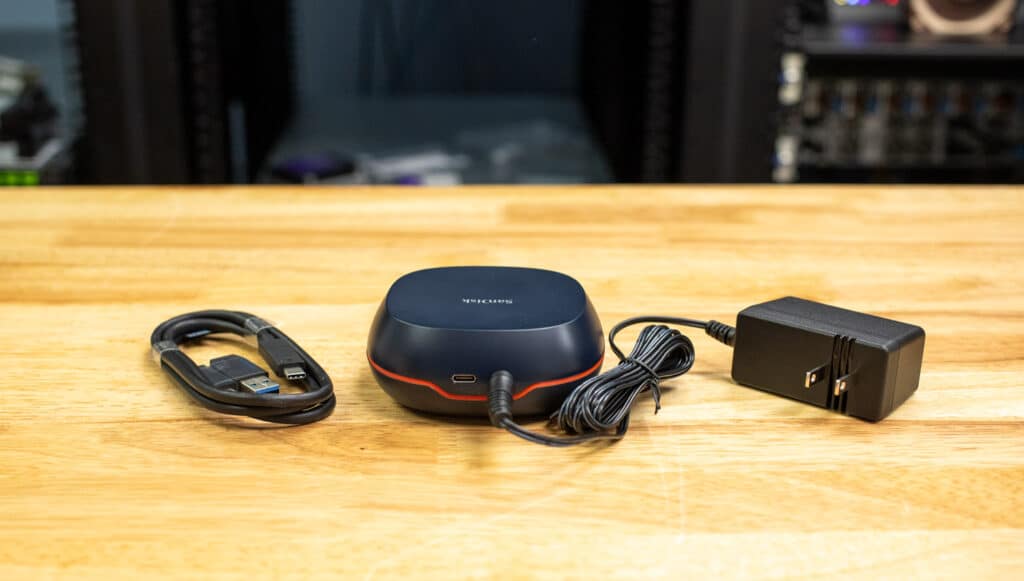
The SanDisk Desk Drive also supports automatic backups through Acronis True Image for Western Digital, a feature that streamlines data safeguarding. This software provides all the usual consumer features, like automated backups, drive cloning, and lost file recovery.
The SanDisk Desk Drive is backed by a 3-year warranty and costs roughly $299 (4TB) and $679 (8TB) at the time of this review (Amazon affiliate link). For this review, we will be looking at the 8TB model.
SanDisk Desk Drive Specifications
| Feature | Specification |
| Form Factor | Desktop SSD |
| Available Capacities | 4TB & 8TB |
| Interface | USB 3.2 Gen 2×1 |
| Transfer Rates | Up to 1,000MB/s read |
| Product Dimensions | 3.90in x 3.90in x 1.58in (99.2mm x 99.2mm x 40.2mm) |
| Packaging Dimensions | 136mm x 67mm x 202mm |
| Product Weight | 0.59lb (268g) |
| Operating Temperature | 0°C to 35°C (32°F to 95°F) |
| Storage Temperature | -20°C to 60°C (-4°F to 140°F) |
| Compatibility | Windows and macOS |
| System Requirements | Windows 10+ | macOS 11+ |
| Security | Kensington Security Slot |
| Software Features | Automatic Backup |
| Limited Warranty | 3 years |
SanDisk Desk Drive Design and Build
In terms of design, the SanDisk Desk Drive certainly looks unique. It measures 99.2mm x 99.2mm x 40.2mm and weighs 268g, featuring a durable pod-like build with a concave front and back panel. This is a bit bulkier than most portable drives; however, the SanDisk Desk Drive is designed specifically to remain desk-side rather than a storage solution for on-the-go professionals.
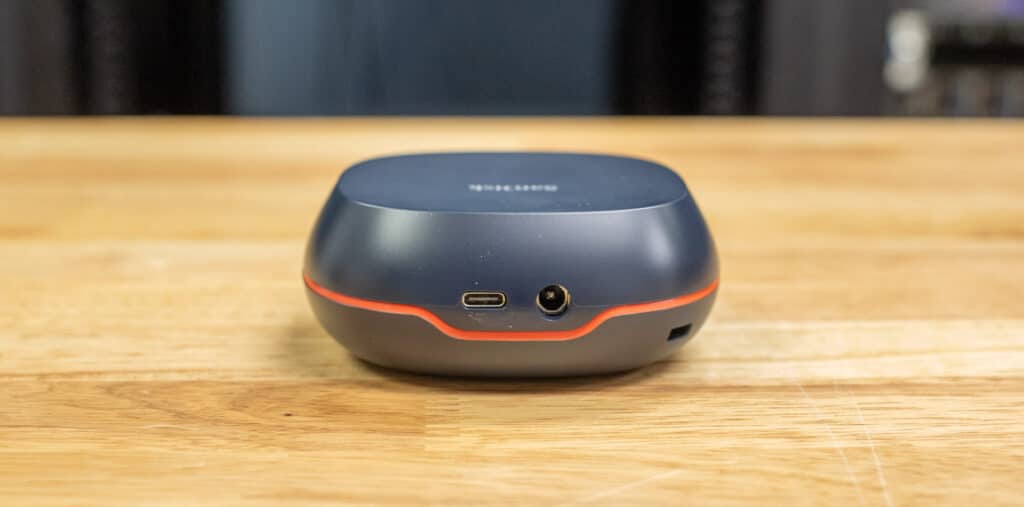
That said, it is compact enough to fit easily on any desk without cluttering the workspace, making it ideal for those with limited desk space or who value a minimalist setup.
The 3.2 Gen 2×1 USB-C port is on the back alongside the power port. The Desk Drive also features the usual Kensington Security Slot, adding an extra layer of physical security, particularly important in shared or open office environments.
SanDisk Desk Drive Performance
For our review, we tested with a Lenovo ThinkStation P520 Workstation. We are comparing our SanDisk Desk Drive 8TB test model to another SanDisk USB 3.2 Gen 2×1 external SSD to evaluate its performance against a popular portable storage option: SanDisk Extreme Portable SSD V2 1TB. This comparison helps determine whether the Desk Drive can be a competitive alternative for desktop and portable use cases.
First up is the Blackmagic test. The SanDisk Desk Drive reached speeds of 915.9MB/s read, and 912.8MB/s write, which was a bit under what was mentioned in the spec sheet. However, this kind of thing is standard for the industry, so there are no real surprises that it slightly underperformed. In comparison, the SanDisk Extreme posted 920.6MB/s read and 950.4MB/s write.
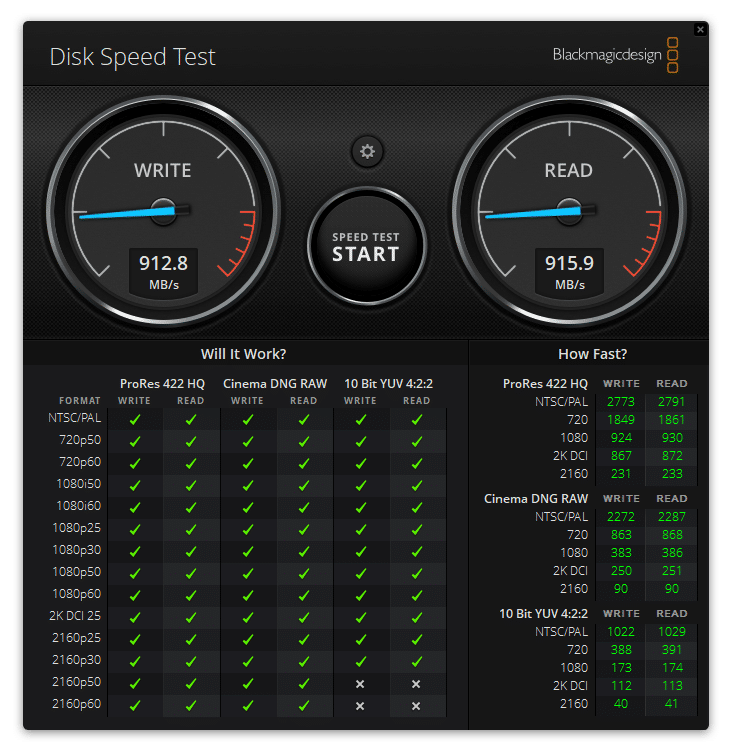
Next up are the IOMeter results. In the 1-thread IOMeter test, the SanDisk Desk Drive delivers strong performance in sequential 2MB read and write operations, with speeds of 932.4 MB/s and 875.8 MB/s, respectively. The random 2MB write at 837.0 MB/s results were acceptable, closely trailing the SanDisk Extreme Portable SSD V2. However, the Desk Drive underperforms in random 2MB read with only 617.4 MB/s, indicating a potential weakness in single-threaded random read tasks. The drive performed great in random 4K read with 8,563 IOPS but slightly lagged in writes at 16,578 IOPS.
| IOMeter (1 Thread) |
SanDisk Desk Drive | SanDisk Extreme Portable SSD V2 1TB |
| Seq 2MB Write | 875.8MB/s | 921.5MB/s |
| Seq 2MB Read | 932.4MB/s | 861.4MB/s |
| Random 2MB Write | 837.0MB/s | 836.2MB/s |
| Random 2MB Read | 617.4MB/s | 853.7MB/s |
| Random 4K Write | 16,578 IOPS | 17,053 IOPS |
| Random 4K Read | 8,563 IOPS | 5,034 IOPS |
Moving on to the 4-thread IOMeter test, the SanDisk Desk Drive demonstrated solid multi-threaded performance, particularly in sequential write and read tasks, achieving 1,098.9MB/s and 1,091.1MB/s, respectively. While random 2MB write performance boasted a respectable 1,020.7 MB/s, it fell short again in random 2MB reads with 657.2 MB/s.
The Desk Drive excelled in random 4K read with 44,903 IOPS, far surpassing its smaller SanDisk Extreme counterpart, and it had a solid 65,791 IOPS in writes.
| IOMeter (4 Thread) |
SanDisk Desk Drive | SanDisk Extreme Portable SSD V2 1TB |
| Seq 2MB Write | 1098.9MB/s | 1,020MB/s |
| Seq 2MB Read | 1091.1MB/s | 1,040MB/s |
| Random 2MB Write | 1020.7MB/s | 870MB/s |
| Random 2MB Read | 657.2MB/s | 1,030MB/s |
| Random 4K Write | 65,791 IOPS | 66,585 IOPS |
| Random 4K Read | 44,903 IOPS | 18,787 IOPS |
Conclusion
The SanDisk Desk Drive is a solid desktop SSD solution that balances high capacity with reliable performance. With storage options up to 8TB (with plans for a 16TB model), it is an excellent choice for users who need substantial space for large files, such as high-resolution videos and multimedia projects. The Desk Drive’s compact design and easy plug-and-play setup make it ideal for professional and personal use, offering seamless integration with Windows and macOS systems.
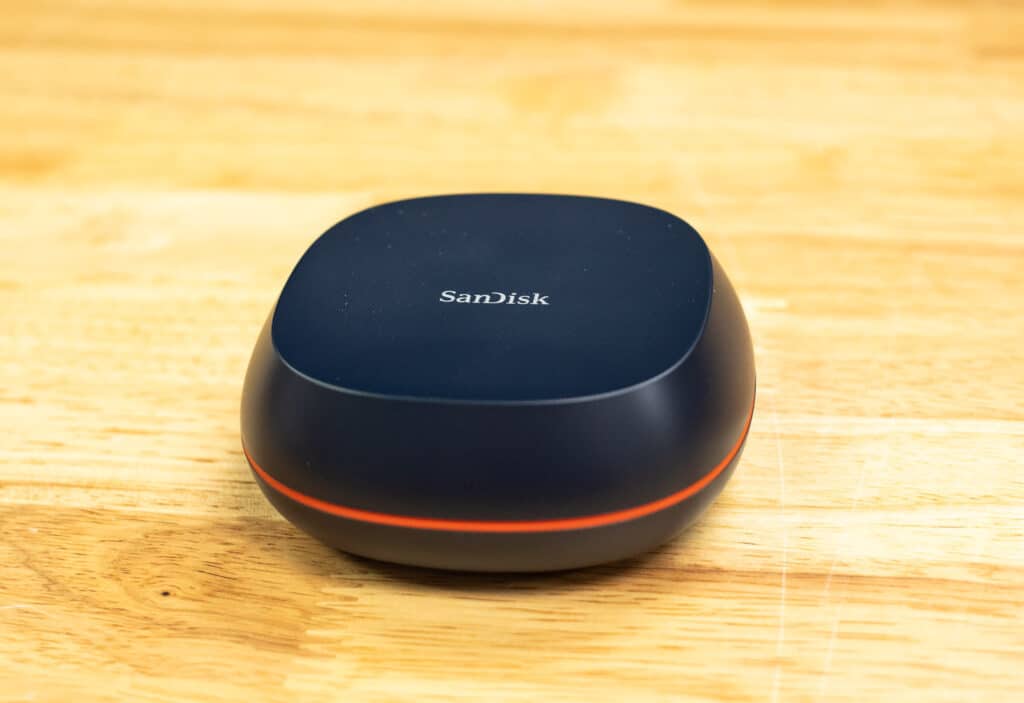
Regarding its performance, the Desk Drive demonstrated strong results in most areas, particularly in sequential read and write tasks, hovering around 1GB/s. These speeds are sufficient for most data-intensive operations, such as video editing, where speedy access to high-definition video files is crucial. It can also be a viable solution for most gaming applications. In random 4K, the Desk Drive also performed well in read speeds, demonstrating it can easily handle workloads with frequent small file access like software development or managing extensive databases.
The large capacity and high-speed performance make this desktop SSD a versatile storage solution. It offers a significant upgrade over traditional external HDDs, providing a faster and more reliable option for everyday tasks and specialized applications that require extensive storage and quick access times. However, while its GB per dollar ratio is comparable to other SSDs, it comes at a premium price, with the 4TB and 8TB models priced at $299 and $679, respectively. Despite the cost, this storage solution is well-suited for those who need both speed and capacity.
Desk Drive at Amazon (affiliate link)
Engage with StorageReview
Newsletter | YouTube | Podcast iTunes/Spotify | Instagram | Twitter | Facebook | RSS Feed

